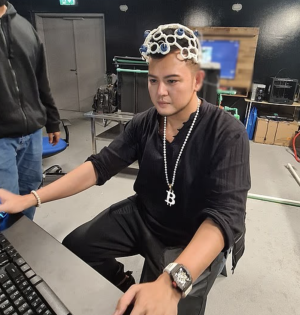"They will be better than humans in every single way": Are "mutant humans" the future—and what does that mean for us?
By
Veronica E.
- Replies 0
The idea of “mutant humans” might sound like something from a comic book—but some experts say the future of humanity could look a lot different than it does today.
Between brain implants, gene editing, and efforts to extend human life, a new wave of technology is already reshaping what it means to be human.
One entrepreneur is even predicting that within just five years, the first generation of enhanced “transhumans” could begin to emerge—raising big questions about aging, ethics, and whether ordinary people could one day be left behind.
Let’s explore what’s real, what’s possible, and what it all means for the rest of us.
Futurist and millionaire entrepreneur Herbert Sim is one of the louder voices in this space.
Through his company, Neurochip.com, Sim has developed a helmet that reads brainwaves and lets people control a computer with their mind.
It's one small step toward what he sees as a much bigger future—one where people can live longer, defeat illness, and even upgrade their mental abilities.

He’s not alone.
Across the world, scientists are exploring ways to enhance the human body and mind. Some of the more notable breakthroughs include:
These advances aren’t superpowers—but they are very real.
Sim believes these technologies could give rise to a new type of person: one that’s enhanced, faster, and perhaps longer-lived than the rest of us.
“Because of these very dominant new races,” he said, “they will be better than humans in every single way.”
That’s where some concerns start.

If only a select few can afford or access these enhancements, could it create a deeper divide between people who are “upgraded” and those who aren’t?
Scientists and ethicists say we need to be careful. Here are a few concerns they’ve raised:
For many older adults, the potential to live longer and healthier is exciting.
Imagine a future where Alzheimer’s and heart disease are treatable, and where you can stay sharp and independent into your 90s—or beyond.
That’s one of the hopes of transhumanism, the movement that advocates for enhancing humans through science.
But like any tool, technology can be used for good—or misused.
Sim himself said it well: “Technology and science are here to empower humans, the same way medicines and phones are here to make our lives better.”
Will we see these “mutant humans” in five years? Maybe. Maybe not.
But what’s clear is that big changes are coming, and many of them are already here.
Some of them might even help us live longer, healthier lives.
Others might raise challenges we haven’t had to face before.
That’s why it’s important we all stay informed, engaged, and ready to ask hard questions—together.
Read next: A common daily habit may raise dementia risk—even for those who stay active

Would you consider enhancing your mind or body if it meant better health or longer life? Or do you think there should be limits to how far we go? Let us know in the comments—we’d love to hear your thoughts!
Between brain implants, gene editing, and efforts to extend human life, a new wave of technology is already reshaping what it means to be human.
One entrepreneur is even predicting that within just five years, the first generation of enhanced “transhumans” could begin to emerge—raising big questions about aging, ethics, and whether ordinary people could one day be left behind.
Let’s explore what’s real, what’s possible, and what it all means for the rest of us.
Futurist and millionaire entrepreneur Herbert Sim is one of the louder voices in this space.
Through his company, Neurochip.com, Sim has developed a helmet that reads brainwaves and lets people control a computer with their mind.
It's one small step toward what he sees as a much bigger future—one where people can live longer, defeat illness, and even upgrade their mental abilities.

Advances in science and technology are bringing once-futuristic ideas closer to everyday life. Image Source: YouTube / Bestie Health.
He’s not alone.
Across the world, scientists are exploring ways to enhance the human body and mind. Some of the more notable breakthroughs include:
- Gene editing using CRISPR to precisely modify DNA, which could eventually treat or even prevent diseases.
- Brain-computer interfaces, like the one created by Synchron, which lets people control devices just by thinking—no surgery needed.
- Animal-human hybrids, where human cells are inserted into animal embryos to grow organs for future transplants.
- Skin cells converted into brain cells, a new approach from MIT that could lead to better treatments for neurological conditions.
These advances aren’t superpowers—but they are very real.
Also read: A groundbreaking medical discovery is making waves—could this be the next big leap in medical innovation?
Are we heading toward a divide?
Sim believes these technologies could give rise to a new type of person: one that’s enhanced, faster, and perhaps longer-lived than the rest of us.
“Because of these very dominant new races,” he said, “they will be better than humans in every single way.”
That’s where some concerns start.

Herbert Sim demonstrates his company’s transhuman helmet, which translates brainwaves into computer actions—blurring the line between human thought and machine control. Image Source: The Daily Mail.
If only a select few can afford or access these enhancements, could it create a deeper divide between people who are “upgraded” and those who aren’t?
Scientists and ethicists say we need to be careful. Here are a few concerns they’ve raised:
- Fairness and access – Will this tech only be available to the wealthy?
- Consent and control – Who decides how it’s used—and on whom?
- Identity and humanity – If our minds and bodies can be changed, what still makes us “human”?
Also read: Ditch the sugar? See which unexpected foods could be harming your teeth
A longer life, or a different one?
For many older adults, the potential to live longer and healthier is exciting.
Imagine a future where Alzheimer’s and heart disease are treatable, and where you can stay sharp and independent into your 90s—or beyond.
That’s one of the hopes of transhumanism, the movement that advocates for enhancing humans through science.
But like any tool, technology can be used for good—or misused.
Sim himself said it well: “Technology and science are here to empower humans, the same way medicines and phones are here to make our lives better.”
Also read: A common daily habit may raise dementia risk—even for those who stay active
So what happens next?
Will we see these “mutant humans” in five years? Maybe. Maybe not.
But what’s clear is that big changes are coming, and many of them are already here.
Some of them might even help us live longer, healthier lives.
Others might raise challenges we haven’t had to face before.
That’s why it’s important we all stay informed, engaged, and ready to ask hard questions—together.
Read next: A common daily habit may raise dementia risk—even for those who stay active
Key Takeaways
- A tech entrepreneur predicts that “mutant humans”—enhanced with gene editing and brain-computer tech—could appear within five years, potentially changing what it means to be human.
- These emerging technologies include CRISPR gene editing, animal-human hybrid research, and wearable brainwave-reading devices, all aiming to extend life and enhance human abilities.
- Examples cited include chips that let people control devices with their thoughts and skin cells being turned into brain cells for potential cognitive enhancement.
- While some fear these breakthroughs could widen inequality, others believe responsible use of transhuman tech could help seniors live longer, healthier, and more independent lives.
Would you consider enhancing your mind or body if it meant better health or longer life? Or do you think there should be limits to how far we go? Let us know in the comments—we’d love to hear your thoughts!






